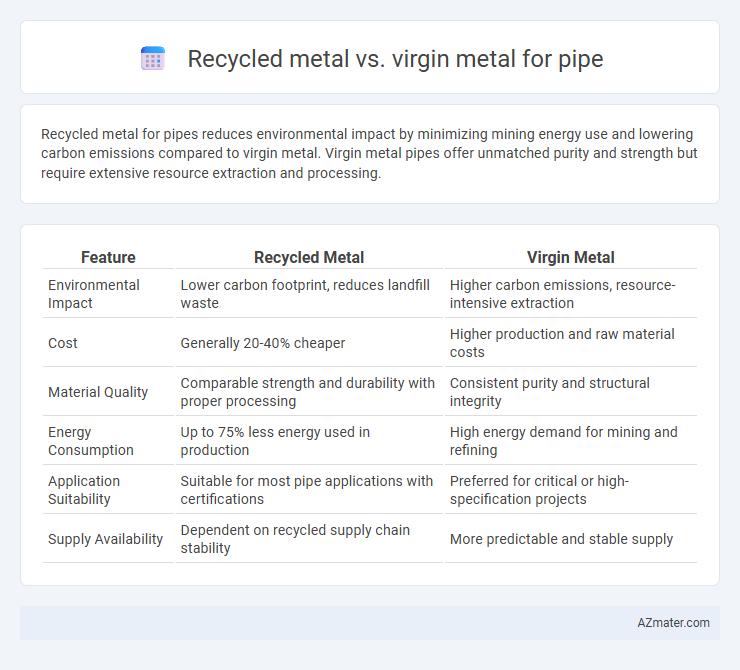Recycled metal for pipes reduces environmental impact by minimizing mining energy use and lowering carbon emissions compared to virgin metal. Virgin metal pipes offer unmatched purity and strength but require extensive resource extraction and processing.
Table of Comparison
| Feature | Recycled Metal | Virgin Metal |
|---|---|---|
| Environmental Impact | Lower carbon footprint, reduces landfill waste | Higher carbon emissions, resource-intensive extraction |
| Cost | Generally 20-40% cheaper | Higher production and raw material costs |
| Material Quality | Comparable strength and durability with proper processing | Consistent purity and structural integrity |
| Energy Consumption | Up to 75% less energy used in production | High energy demand for mining and refining |
| Application Suitability | Suitable for most pipe applications with certifications | Preferred for critical or high-specification projects |
| Supply Availability | Dependent on recycled supply chain stability | More predictable and stable supply |
Introduction: Recycled Metal vs Virgin Metal in Pipe Manufacturing
Recycled metal in pipe manufacturing significantly reduces environmental impact by lowering energy consumption and conserving natural resources compared to virgin metal. Pipes made from recycled metal maintain high strength and corrosion resistance, meeting industry standards while promoting sustainability. The choice between recycled and virgin metal affects production costs, carbon footprint, and resource efficiency in pipe fabrication.
Environmental Impact: Assessing Carbon Footprint
Recycled metal pipes significantly reduce carbon footprint by lowering energy consumption during production compared to virgin metal extraction and processing, which emit higher greenhouse gases due to mining and refining. Utilizing recycled metals conserves natural resources, reduces landfill waste, and decreases harmful environmental pollutants linked to raw material extraction. Lifecycle assessments consistently show recycled metal production generates up to 75% fewer carbon emissions than virgin metal manufacturing, making it a more sustainable choice for piping materials.
Material Properties: Strength and Durability Comparison
Recycled metal pipes often exhibit comparable strength to virgin metal pipes due to advanced refining processes that remove impurities and retain core metal properties. Both recycled and virgin metals maintain high durability, but recycled metals may sometimes have slight variations in microstructure that require specific treatment to match virgin metal performance. Carefully controlled recycling ensures the mechanical integrity and corrosion resistance of recycled metal pipes remain suitable for demanding industrial applications.
Cost Analysis: Recycled vs Virgin Metal Pipes
Recycled metal pipes typically offer significant cost savings over virgin metal pipes due to lower raw material expenses and reduced energy consumption in production, often resulting in price reductions of 20-40%. Virgin metal pipes demand higher capital investment linked to extensive mining, refining, and processing, which escalates overall costs. Choosing recycled metal pipes not only supports sustainable practices but also enhances project profitability through lower procurement and manufacturing expenditures.
Energy Consumption in Metal Production
Recycled metal used in pipe manufacturing reduces energy consumption by up to 75% compared to virgin metal production, significantly lowering carbon emissions and resource depletion. The energy savings primarily stem from bypassing the energy-intensive ore extraction and refining processes associated with virgin metals. By integrating recycled metal, pipe producers achieve more sustainable manufacturing with a reduced environmental footprint and lower operational costs.
Supply Chain Sustainability and Resource Availability
Recycled metal significantly reduces environmental impact by lowering energy consumption and greenhouse gas emissions in the pipe manufacturing supply chain compared to virgin metal. Utilizing recycled metal enhances resource availability by minimizing the depletion of finite ores and promoting circular economy practices within the metal industry. Supply chain sustainability benefits from recycled metal through reduced mining activities, lower transportation distances, and improved material traceability in pipe production.
Regulatory Standards and Industry Compliance
Recycled metal used in pipe manufacturing must meet stringent regulatory standards such as ASTM A106 and API 5L to ensure material integrity and safety comparable to virgin metal pipes. Industry compliance mandates comprehensive traceability and certification, verifying that recycled content adheres to mechanical properties and chemical composition specifications critical for pressure and temperature ratings. Enforcing these standards supports sustainable production while maintaining performance reliability in applications like oil, gas, and water transportation.
Performance in Different Pipe Applications
Recycled metal maintains comparable structural integrity and corrosion resistance to virgin metal, making it suitable for most pipe applications, including water, gas, and industrial pipelines. Virgin metal often offers slightly higher purity and uniformity, which is critical in high-pressure or highly corrosive environments where maximum material performance is essential. Pipe manufacturers increasingly optimize recycled metal alloys to meet or exceed industry standards such as ASTM and API, ensuring reliable performance across diverse applications.
Long-Term Maintenance and Lifecycle Considerations
Recycled metals used in pipes often exhibit comparable durability to virgin metals, reducing environmental impact without compromising structural integrity over time. Long-term maintenance of pipes made from recycled metals can be more cost-effective due to lower susceptibility to corrosion when properly treated. Lifecycle assessments reveal that recycled metal pipes lower energy consumption and greenhouse gas emissions throughout production and disposal phases, enhancing sustainability in infrastructure projects.
Future Trends: Innovations in Metal Pipe Materials
Recycled metal pipes increasingly incorporate advanced alloying techniques and nanocoatings to enhance durability and corrosion resistance, promoting sustainability and cost-effectiveness in infrastructure projects. Innovations in metallurgical processes enable recycled metals to match or surpass the mechanical properties of virgin metals, fostering wider adoption in high-performance applications such as oil and gas pipelines. Future trends emphasize circular economy principles, integrating smart sensors within recycled metal pipes for real-time monitoring and predictive maintenance, revolutionizing asset management and extending service life.

Infographic: Recycled metal vs Virgin metal for Pipe
 azmater.com
azmater.com